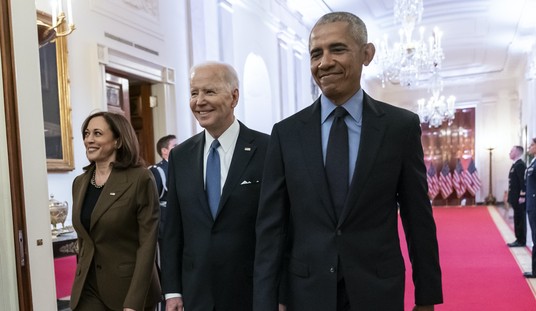Of all bogus politically correct phrases, I think “people of color” is the most reliably emetic. What, after all, does it mean? Who gets to be a “person of color”? Not me, apparently, though I like to think of myself as a pleasing pinkish hue (I’m not talking about political complexion, merely my Crayola designation). To me, “people of color” is a bit like “native American,” only worse. I always identify myself as “native American” because (or so I have been reliably assured) I first came into this world just outside of Cleveland, Ohio, than which no more American place can be imagined. Why do American Indians get to be “native Americans” while I, whose natality was smack dab in the middle of America, must be content who some less privileged rubric? And why do blacks and other assorted ethnicities get to be “people of color,” with all the spurious rights and privileges pertaining thereto, while I, who most certainly possess a color, am left out of the great politically correct grievance-mongering sweepstakes?
I thought about this yesterday when I was in New Haven participating in a conference on “The Future of Free Speech” sponsored by the William F. Buckley Jr. Program at Yale. No sooner had I and my colleagues arrived in Elm City than we discovered, courtesy the Yale Daily News, that the delicate snowflakes at one of the richest and most coddled institutions in the world were angry, outraged, tearful, absolutely beside themselves with rage and horror. “Students Demand Admin Response to Racial Controversies,” screamed the front-page headline. The story went on to describe a 3-hour confrontation between 200 students and Jonathan Holloway, dean of Yale College. “Surrounded by a sea of upturned faces and fighting back tears,” the story began, Dean Holloway “stood on the Women’s Table [nice touch!]. . . to break the administration’s silence on allegations of racial discrimination that shook [shook!] campus this week.” [UPDATE: Why hasn’t this girl been expelled?]
What happened? Was a black student lynched, made to sit at the back of bus, denied entry to the tennis court or Mory’s? Nope. The alleged tort emerged from Erika Christakis, the wife of the master of Silliman College. What had she done? Sit down. This will really shock you. She sent round a comically hand-wringing email agonizing over the deeply vexed question of what was appropriate in the matter of Halloween costumes. “I wonder,” she wrote, “what is the statute of limitations on dreaming of dressing as Tiana the Frog Princess if you aren’t a black girl from New Orleans? Is it okay if you are eight, but not 18? I don’t know the answer to these questions; they seem unanswerable. Or at the least, they put us on slippery terrain that I, for one, prefer not to cross.”
Yes, deep waters, Erika! But after a bit more handwringing and subtle exhibition of her politically correct credentials (“When I lived in Bangladesh . . .”), she came up with an admirably mature conclusion:
Nicholas [her husband] says, if you don’t like a costume someone is wearing, look away, or tell them you are offended. Talk to each other. Free speech and the ability to tolerate offense are the hallmarks of a free and open society. . . .
In other words: Whose business is it to control the forms of costumes of young people? It’s not mine, I know that.
Sounds right to me.
But the natives went wild. How “insensitive” she was to say that young adults at Yale University ought to be able to wear any damn costume (or none) they liked. Hence the “three hours of emotional confrontation” between anguished students and Dean Holloway (“an impromptu event which ballooned out of a chalking event on Cross Campus in support of Yale’s people of color”).
Really, you cannot make this stuff up. I was prepared to file the story away in that capacious bin marked “Inanities, academic” and forget about it when the anguish spilled over into the conference I was attending. During the second session, Greg Lukianoff, the president of the Foundation for Individual Rights in Education and author of Unlearning Liberty: Campus Censorship and the End of American Debate, reflected on the bizarre reaction to Erika Christakis’s email. Lukianoff had had a front row seat to the controversy during a talk he gave at Silliman College the day before. What could explain the tsunami of anguish? You would have thought, he said, that Mrs. Christakis had “burned down an Indian village” or something.
Uh oh. It was shortly after that comment that a distraught student walked into the hall where the conference was proceeding and began taping up signs that read:
“Stand with your sisters of color. Now, here. Always, Everywhere.”
He had put up about ten signs before a security guard asked him to leave. Nothing doing. The guard asked again. Nada. So he grabbed the student and dragged him, kicking and screaming, from the room. What was he screaming? The chief burden of his plaint revolved around that Indian village. Greg Lukianoff had said that the response to Erika Christakis’s email was so violent that you would have thought someone had destroyed an Indian village. He didn’t advocate destroying an Indian Village. No villages of any sort were despoiled in the conduct of his remarks. He merely suggested that the response to an email treating students as responsible adults (first mistake!) was wildly disproportionate.
That bit of hermeneutical reasoning was beyond the distraught, poster-wielding student. And not only him. Soon there was a crowd of twenty students demanding to get into the attendance-by-reservation only event. Then there were fifty or more. Soon they were chanting loudly outside the hall. “Genocide is not a joke” was one of the little ditties with which they entertained us. By the time the last session began, word came that they intended to bar the exits. More security was marshaled and when the proceedings came to an end the speakers and the audience were escorted out of the room. A cordon of enraged students holding signs and yelling “Genocide is not a joke” greeted us. Another fifty or so lined the sidewalk outside.
No, genocide is not a joke, but politically correct stupidity is. This year, it costs $65,725 to attend Yale. Doubtless many of those snowflakes who attempted to disrupt an event devoted to discussing the fate of free speech on campus and beyond are attending on someone else’s nickel. But still, the spectacle of such fatuous exhibitionism makes one wonder at the expensive and straining gassy bubble that is the higher education establishment today. What happened at Yale yesterday was partly funny. Mostly, though, it was sad and contemptible. One thing is certain: it won’t go on much longer. As Glenn Reynolds has observed, citing the economist Herb Stein, what can’t go on forever, won’t. This nonsense on our college campus is fast approaching a ne plus ultra of inanity. There will be more casualties along the way. I predict, for example, that the Christakises will have to go, sops to the great Moloch of political correctness (an irony, there, since they are self-professed Leftists). Yale University, like other elite American educational institutions, is one of the richest and most coddled environments ever conceived. Yet it is increasingly inimical to freedom or adult behavior. Personally, I think we ought to call a moratorium on liberal arts colleges. Close ’em all down for, say, ten years to let them air out. Then, perhaps —perhaps—they will be sufficiently fumigated that some semblance of serious education can once again take place within their ivy-bowered halls.










Join the conversation as a VIP Member